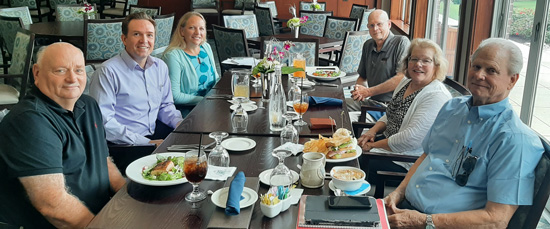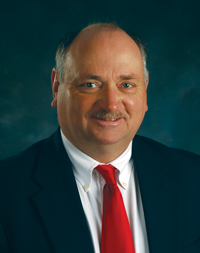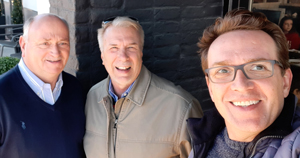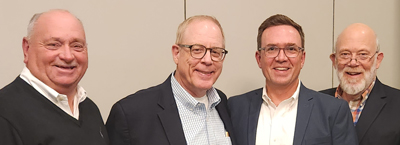Rick Pierce’s path from college to heading his own rep firm could be described as more “typical” compared to so many other agency owners who have been profiled in Agency Sales magazine.
So many others have begun careers in far-flung ventures covering everything from teaching, law enforcement, and even professional sports. For Pierce it was an entirely different story. After studying marketing in college, he began a sales career with a manufacturer. In his words “I began working for a manufacturer as number 32 in their sales force of 32. I left 14 years later as number two.”
His reason for leaving the manufacturing firm will probably sound familiar to others. “Sales were up, and things were going so well, my boss decided the wise thing to do was to cut my commissions in half. My response to that was ‘No way. We’re not doing that.’ So I decided to leave.”
Fortuitously, Pierce had remained friendly with a former boss who was working successfully with reps. “He let me know that two of his reps were working very well. I hit it off well with them and was able to sub-rep for them. Eventually I got my own lines, and we parted ways. That was my start.”
Pierce & Company, Dayton, Ohio, was founded in 1994. The name and corporate structure was changed to Pierce Marketing, LLC, in 2008 and he has been a MANA member for more than 25 years. The agency serves a variety of industries including:
- Automotive
- Appliance
- Lawn & garden
- Power transmission pumps/fluid handling
- Medical
- Lighting
- Garage door
Speaking to the diverse nature of the industries he serves, Pierce explains, “Industry-wise, everything I do fits together. The only caveat I have is I don’t care what it is, but it must have a larger volume as I specialize in major account selling.”
He adds, “It’s a big world out there and the supply chain is complex. Most of our business is in the U.S. Midwest and parts of the southern United States. We also handle accounts worldwide when our customers need us to do so.”
Finding Principals
As he noted, it was when he signed his own lines that he went off on his own. Since then, he’s been faced with the same task other reps have in terms of locating manufacturers to work with. “As to how I locate lines, I’ve employed a number of methods. I’ve located several companies through MANA and its website. Others, I’ve found through my involvement with The Manufacturers’ Agents of Cincinnati (MAC). In addition, I’ve received a number of solicitations from manufacturers and even located some through trade magazines. I’d say I get at least three or four contacts from prospects every month.”
When considering whether or not to take on a prospect, Pierce notes that “I’d say I’m a bit different than most. What I’m looking for in a manufacturer is one that’s not tiny, but not huge. I would like something right in the middle, perhaps between $20-$100 million. I like a firm that’s still family owned so I can easily get to the top person and not have to go through layers to find him. I also want a company that will allow me to work on large accounts. I tend to work on larger volume accounts. I want the manufacturer to be okay with paying me on multi-million-dollar accounts. My attitude is I get five percent, and you get 95 percent and you set the price. That’s the kind of conversation I want to get into with a manufacturer. I also let any prospective manufacturer know that I’m interested in a long-term vs. a short-term relationship.”
When he’s asked if he has any interest in working with international manufacturers, Pierce explains, “In general I’m a rep who likes his principals close. Most of my principals are in Ohio and others are in Pennsylvania and one in Chicago. They’re all in driving distance from me and most of my customer base.”
Pierce adds that he doesn’t shy away from bringing up the subject of retainers when it comes to dealing with a manufacturer. “I’d have to admit that I’m pretty adamant on that subject. Some manufacturers will do it, others won’t. If they’re not agreeable at the outset, I let them know we can do this one of two ways. At the beginning of the relationship, you turn over accounts to me and I can build them bigger. You pay me a lower commission on existing accounts and larger commissions on new business. We need to have some sort of agreement at the beginning to make this relationship work.
“On the other hand, if I find that I’m getting a lot of pushback in the discussion, I stop the conversation and say ‘Let me understand what’s going on here. You want me to take on your line and negotiate for you in the territory. At the same time, you’re not agreeable for me to negotiate for myself in dealings with you. If I can’t sell for myself, how do you think I’m going to be able to sell for you?’”

A MAC (Manufacturers’ Agents of Cincinnati) Board meeting, counterclockwise from left:
Rick Pierce, Mark Hogan, Corin Hogan, Dick Harvey, Lynn Adams, and Jeff Witt.
Agreeing to Retainers
He continues that if the manufacturer agrees to a retainer relationship or turns over accounts, “That shows he has an interest in the relationship and he’s willing to put some ‘skin in the game.’ If he’s not agreeable, it’s a situation where I just can’t beat my head against the wall, and I’ll walk.”
In addition to the expected sales function that all reps provide their manufacturers, Pierce also offers consulting services for manufacturers. According to information on the agency’s website:
- “We focus on manufacturing companies and work with anyone from startups to Fortune 500 companies. The decision makers that we serve are typically the Owner, CEO, President, Board of Directors, or Director of Sales.
- “Our sales consulting engagements have a proven record of increasing sales for our clients. As simple as that.
- “Our services are custom-tailored for your needs. It all starts with an initial conversation where we learn your current situation and understand your future goals.
- “Then comes a core assessment where we ask the right questions. After we agree on what the correct answers need to be, we then help you work toward the end goal through close collaboration.
- “When we first meet, we will get a general sense of the project scope. Typical sales consulting engagements are measured in weeks/months. Whatever it takes to achieve the stated goals.
- “We are usually on-site during our consulting engagement. We can conduct portions of our service virtually as needed.”
Pierce adds that this service “…isn’t so much for the manufacturers I’m currently repping. I figure there are a number of manufacturers out there who want/need salespeople but don’t necessarily know what they’re getting into when it comes to working with reps. It’s all about letting them know how to find and deal with the right reps, treating them and paying them fairly.”
Final Thoughts
This year, as he marks his 30-year anniversary as a rep, Pierce offered some additional thoughts on what he’s experienced over the years.
Losing lines — “We’ve all lost lines. Bottom line, you’ve just got to be prepared. As to how you recover, you just try to keep feelers out there, learn what’s going on and make the necessary adjustments. In the past, I’ve worked with MANA and MAC when I’ve lost a line. I’ve also worked with very good rep-savvy attorneys who have helped me. By taking all those steps, you can always sub-rep a line or pick up a new line. I’ve been very quick to adjust.”
Time management — “Thankfully I’m very focused and I don’t chase every little account out there. I only chase the larger accounts and I prioritize on the things that are important. I only rep four companies now and concentrate on them. Also, I’m very big on staying in touch with my principals. I talk to them a great deal. We’re on the same page when it comes to what’s happening in the territory and there are no surprises.”
Changes in the profession — “Not all the changes — specifically with technology — have been for the better. Technological changes have been okay and I’ve easily been able to adapt. Added to that, I like working remotely. That’s been good for me. However, the problem today is that we all used to be able to go into a company and meet with purchasing, engineering, and other decision makers. Maybe we’d meet with six to 10 people in one day. Now, nobody is there. You visit a company and learn one of your contacts only works remotely or is only in the office one or two days a week. You really can’t achieve the same energy we used to have.
“For me, the remedy has to be to keep connected and work with customers the way they want to be worked with. I make every effort to conference them in and make use of Zoom and Team meetings.”
Manufacturer appreciation — “I don’t think all manufacturers understand what it takes to get the large accounts. By that I’m referring to all the time and effort it takes to get in the door. Once we get them there, they’re always pleased that we’ve done everything correctly.”
As to who might be at fault for that perception, Pierce adds, “There’s probably a little bit of fault on both sides. From the rep’s perspective, maybe we just want to do a little whining. And, from the principal’s viewpoint, they’re just expecting more from us faster.”
Challenges — “Looking back over the 30 years as the head of my own agency, I’ve had any number of surprises and challenges I’ve had to deal with. There have been so many twists and turns, but I keep on coming back because this has been a horrible and absolutely wonderful career at the same time. I’ve sold a lot, made a lot of money, lost a lot of money and have had principals come and go overnight.
“I really enjoy what I do and could never work for someone else. Being a rep is a wonderful way to get into business for yourself. And it’s been very rewarding for me.”
MANA — “I originally learned about MANA through my involvement with MAC. I’ve always made it a habit to search out the smartest guy in the room. So, it was at a MAC meeting that I met George Hayward, former Chairman of Board for MANA. He and I would talk for hours. He told me about the association, and I’ve been a member ever since.”
MANA welcomes your comments on this article. Write to us at [email protected].




